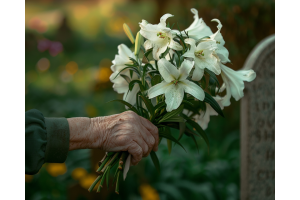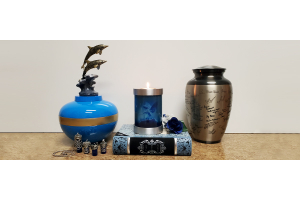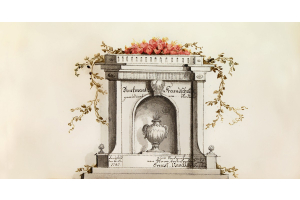
1 May 2015 • Last updated 15 May 2024 • 11 min read
Not all ashes from people who have been cremated are claimed. There are a number of reasons behind unclaimed cremated remains, and it's an issue that occurs all over the world. Funeral directors generally try to reunite forgotten ashes at funeral homes with family members of the deceased, but that's not always possible. Understanding all the options you have for storing cremated remains can make it easier to claim a loved one's ashes and have a plan for what to do with them. With a wide variety of different types of urns to choose from, you can place their ashes into a container you feel good about, to help provide you with closure.
Susan Fraser
Founder
This post has been updated as of May 2024 to reflect current data and information.
Introduction
There are many reasons that people never go to collect their loved one's cremains. For example, difficulty scheduling a memorial or family members unprepared to accept the death of a loved one could mean that ashes sit at the funeral home instead of being claimed.
The number of uncollected urns at funeral homes has been increasing, and it's a problem all over the world. While most funeral homes simply hold on to the ashes, waiting for the family to come get them, some funeral directors are taking matters into their own hands. While the decision to leave the ashes at a funeral home is considered an option by many, there are more dignified choices to give closure to the life of the deceased.
Here's what to know about abandoned cremated remains, and how you can find the right urn and make important choices after the loss of a loved one.
Uncollected Ashes in North America
Across North America, the stories about uncollected ashes are all similar in many ways. From California to Quebec, funeral directors are at a loss to determine what to do with the rising numbers of uncollected urns in their funeral homes. The Cremation Association of North America (CANA) maintains data about cremation in this region. And, for the 23,000 funeral homes in North America, uncollected ashes are a fact of life.


According to a 2020 article in Verywell Health, approximately 1% of all cremations result in unclaimed ashes. With the cremation rate being just over 53% of all deaths and the number of deaths in a typical year, that means over 15,000 cremated remains were never picked up by loved ones in the United States alone, just in one year's time. In fact, CANA estimates that there are more than two million urns in funeral homes across North America, waiting to be collected.
In many cases, the matter is more personal, and there are emotional and practical challenges that families face when they're deciding what to do with cremated remains. CANA’s executive director Barbara Kemmis told Global News that after families have begun to pick up the pieces, they aren't always clear on what's next. If they don't understand their options for scattering the ashes, burying them, or choosing an urn, they may elect to do nothing, and leave the ashes with the funeral director.
Key Takeaway: A large number of people leave the ashes of their deceased loved ones at funeral homes throughout North America, and that's creating a cremated remains storage problem for funeral directors. This often happens because people are grieving, and they don't know the options they have for storing or scattering the ashes.
A Worldwide Problem That's Getting Some Solutions
In the United Kingdom, funeral homes face the same concerns surrounding abandoned cremated remains as their North American counterparts, and the older the funeral home the older the ashes. BBC noted that some funeral homes in the U.K. have urns from the 1910s or 1920s. One funeral director in Southampton, England begged for people to collect some of the 405 urns waiting at a single funeral home.
All over the world, funeral directors often cannot conclude what to do with the ashes, and some funeral homes are becoming crowded due to cremation’s rise in popularity. Funeral directors dread making a decision to scatter or bury uncollected ashes, only to have the family members return to collect them, and this does occasionally happen.
Key Takeaway: It's not just North America where unclaimed cremated remains are a problem, and there aren't that many funeral home ashes policy guidelines to determine what should be done with unclaimed ashes.
Funeral Directors Are Taking Action
While most funeral homes make earnest attempts to either keep abandoned cremated remains or find family members to collect ashes, others have no choice but to take action. Depending on local cremation laws and regulations, funeral homes must keep the ashes for a certain amount of time. In some states that amount of time is years, and in others it could be a matter of a few months. After that, it's up to funeral directors to decide.
Kemmis of CANA told Global News that funeral directors sometimes scatter or bury the unclaimed cremated remains themselves. When they do this, they usually keep meticulous records of the names of the deceased and where the remains were scattered or buried. Some funeral directors believe that it's important to find a final resting place for the deceased, which should not be in the funeral home.
Idaho introduced a bill in 2024 that will give funeral directors guidance on what they can and cannot do with forgotten ashes at funeral homes, helping funeral homes come up with policies that address cremated remains storage and the cremation options families have for their loved ones. Additionally, states such as Oregon are publishing online lists of unclaimed cremated remains, in an effort to reunite families with the ashes of loved ones.
Key Takeaway: There aren't too many clear guidelines on what to do with unclaimed ashes beyond some jurisdictions having requirements for how long they have to be held. Because of that, funeral directors are frequently left to make these decisions on their own.
Modern Issues Require Modern Approaches
One of the reasons people leave the cremated remains of their loved ones at a funeral home is that they simply cannot decide what to do with the ashes. They're unaware of the many options available to them these days. Ashes may be scattered in many places, buried underground, placed in a cemetery, or even scattered at sea.


Although people may choose to keep the ashes of the deceased near them in a classic brass urn, they have other choices to protect the ashes and keep them in their home. Many urns today are designed for scattering, burial, or as keepsakes. Some are even biodegradable, and that's important for people who are trying to be mindful of the impact they have on the planet. Disposition methods affect the Earth, and it's valuable to know how much of an impact a particular disposition choice will have before moving forward with it.
Urn manufacturers use a variety of materials to construct the urns, including the following:
There's a wide variety of choices in color and style, too, depending on what the family intends to do with the ashes. That way, people can select the urn that demonstrates the loved one’s style and personality. Additional options for cremated remains include cremation jewelry urns and custom urns.
Key Takeaway: Scattering and burying ashes are options, but a lot of people choose urns that reflect the personality of the deceased or showcase something they loved in life.
Understanding the Alternatives for Collecting Ashes
Every funeral home has at least a few urns containing ashes that sit uncollected by the family. While in most cases, funeral directors wait for families to return, some eventually decide to scatter the ashes themselves. When people know the many alternatives they have for the cremated remains of their loved ones, they can make a choice that doesn't involve leaving the urn at the funeral home.
Talking about what you want with your loved ones, and finding out their wishes, is a good way to feel more confident that you'll make the right choice for them and can help you avoid the issue of forgotten ashes at funeral homes. You can also have peace of mind, knowing your loved ones will honor your wishes if you predecease them. Since there can be many religious and cultural assumptions made around death, burial, and cremation, as well as the disposition or storage of ashes, it's important to have these kinds of conversations and create a will and other documentation that makes your final wishes clearly known.
It's understandably hard to lose a loved one, and picking up their ashes feels so final that some people struggle to take that last step. However, with the right style and type of urn, grieving individuals and families can collect the ashes in a vessel that provides proper cremated remains storage and will also bring back fond memories of their loved one and the important role that person played in their life.










In the State of Maryland, an executor is required to hold an heir's share of an estate for 6 months before distributing it to the other heirs. This is known as the "estate administration period."
In the case of the ashes, the executor is not required to hold them for the full 6 months if the heir has not responded to their requests. However, it is still a good idea to wait a reasonable amount of time before distributing them to the other heirs.
A reasonable amount of time would depend on the specific circumstances. For example, if the heir is living in another state, it may take longer for them to receive the request and respond.
If the heir still does not respond after a reasonable amount of time, the executor can distribute the ashes to the other heirs.
It is important to note that this is just a general overview of the law. The specific requirements may vary depending on the circumstances. It is always best to consult with an estate attorney to get specific advice.
Here are some additional things to keep in mind:
The executor should keep a record of all of their communications with the heir. This will help to protect them in case the heir later challenges the distribution of the ashes.
The executor should also keep a record of the date on which they distributed the ashes. This will help to ensure that they do not violate the 6-month estate administration period.
I hope this helps!
Certain laws in regards to cremation will differ from state to state, what state are you located in?
All funeral homes are different when it comes to the way they do business in regards to reaching out to a family after the cremation is done, but usually a phone call would be standard then possibly a follow up email or letter depending on the contact information provided. Most state laws require a funeral home to hold onto the cremains for a minimum of 4 years. How long ago was she cremated? Have you tried getting any info from the nursing home who helped set up the cremation?
Sincerely,
Susan Fraser